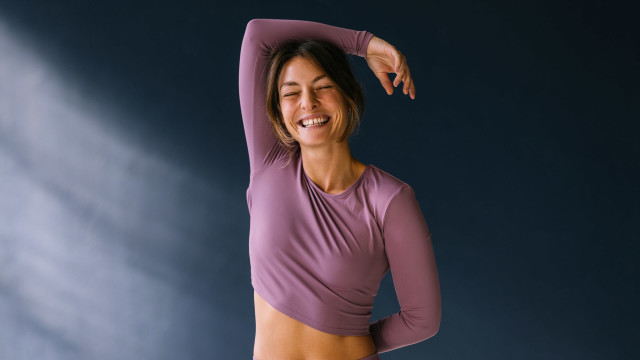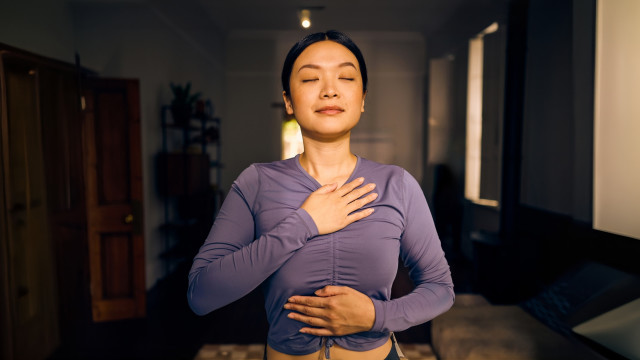Cultivate Love for Your Body

I grew up never knowing what love was, let alone self-love. I was abandoned by my biological mother at six weeks, and I grew up in an orphanage in the UK where I experienced racial trauma. The adults nicknamed me “Gruesome,” and the kids parroted that. At 5 or 6, I didn’t know exactly what it meant, but I knew it was something horrible.
Before I got to the orphanage, I’d lived in four homes. I felt that no one loved me and no one cared about me. Research suggests that women who experience chronic stress while pregnant are more likely to have children with, "neurodevelopmental changes that ripple into adolescence and adulthood," writes Diana Divecha, Ph.D., and because my parents didn’t want me, I picked up on that.
In particular, I hated my body. I remember being in a kids’ home when I was about 12, and there was an adult there who was kind to me — in fact, we’re still friends today — and I would repeatedly say, “I hate you” to him because that’s all I knew. It wasn’t until I fell in love for the first time that I realized I didn’t know anything about love.
From there, I started to learn about loving others, and I got to a place where I was capable of receiving some love. When a relationship in my 20s ended, it was really difficult and I remember thinking, “Who’s going to love me now?”
That relationship ending turned out to be a great gift because I realized I finally had to learn to love myself.
A Loving-Kindness Practice to Try
Even if you didn’t experience the kind of trauma I did in childhood, you might struggle with self-love. It’s a common issue because we exist in a culture that's just beggining to learn about it, with many people still trying to shed systemic ideals of beauty and success. This makes us prone to hating perceived flaws instead of celebrating our bodies for what they can do.
The first step in cultivating self-love is to recognize that it’s OK if you don’t love yourself at the moment. Beating yourself up for not loving yourself isn’t going to help anything. Become familiar with the idea that you don’t yet love yourself, and start from there.
I like to do a loving-kindness practice that involves focusing on different aspects of the body. First, find something you do like about yourself. There’s always something that we do like, as tiny as it is, and if we just reflect on that, focus on that, and cultivate that, we can move closer to loving our whole selves. Maybe it’s your fingernails, your hair, your smile, the sound of your voice, or the shape of your ear. Send it kindness.
Then put your focus on a part of your body that you don’t often pay attention to. For me, I’d say feet is one of those things — these feet carry me in the world and I don’t pay attention to them. Whatever this is for you, send it kindness.
And then think of a piece of your body that you don’t like, and just focus on it. Sit with it. And again, send it kindness. This is one technique you can try as you learn to love yourself.
Practicing Good Habits
When cultivating self-love for your body, remember that no one is perfect, no body is perfect — if you lined up a whole bunch of bodies in a row, not one would look the same as another.
It’s helpful to have gratitude for your body — have gratitude that it carries you through this world; enables you to pursue a career, raise your children, read a book, or make a cup of coffee. Every morning when you wake up, think, “What’s one thing I have gratitude for about my body?” It might feel difficult at first, but in time, the gratitude will come more naturally and you won’t even have to ask yourself — you’ll automatically feel grateful for everything your body does for you.
Once your self-love grows stronger, you might hear a critical thought and be able to let it pass. If a thought’s trying to pull you down, you can laugh and tell it to shut up. I like to let people know that when these thoughts arise, they’re just telling you that you’re experiencing some vulnerability, and that’s OK — vulnerability isn’t a bad thing. What’s important to remember is that you don’t have to act on those thoughts.
It’s a journey to get to a place of self-love, and for some people, it can be a long journey. Once upon a time, I would hear “I hate myself” and I’d match it with “I love myself.” And that was brilliant because the more I heard it, the more I started to believe it. I remember the first time “I love myself” popped into my head where I didn't have to say it mechanically. It was a good reminder that this is a practice, and we can strengthen this muscle and get better at loving ourselves.
Try this course, Detox Your Heart of Anger, Fear, & Hatred by meditation teacher Valerie (Vimalasara) Mason-John, to learn how you can shed long-held beliefs that no longer serve you.
Header photo: recep-bg/E+/Getty Images









